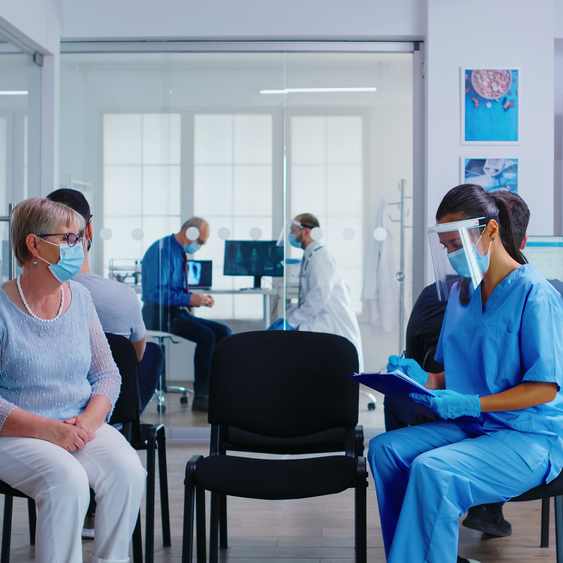COVID-19 IMPACT REPORT: RECOVERY
The impact on staff and priorities for recovery
Over 2300 respondents to national research to identify the long-lasting impact on staff because of the pandemic, and the challenges and opportunities for recovery.
In this section:

Foreword
For most of us working in and for the Healthcare sector, the fight against COVID-19 has been a full on, 24/7, no time to draw breath, slog of epic proportions. No one has experienced anything quite like it, where the consequences of getting it wrong can have such a catastrophic impact on the patients and service users we serve.
As we approach the next phase of the pandemic, I know many will be approaching the task with the same degree of passion and commitment, and this time around we have the benefit of insights and intelligence, like this important report from Skills for Health ‘Covid-19 insights – impact on staff and priorities for recovery’.
The report highlights, that among other things, organisations have relied on the five ‘R’s to help manage the pandemic; Reduced spending, Redeployment, Recruitment practices, Remote working, and sadly and likely to increase, Redundancies.
When this research was commissioned, I had hoped to be writing a foreword reflecting on how the sector had responded and risen to the challenges of the pandemic. However, as we approach the next wave, it seems right to emphasise the ongoing support we need to give our staff and leaders who have been nothing less than inspirational.
Dean Royles, President
Healthcare People Management Association (HPMA)


Health and wellbeing
The pandemic has had a substantial negative impact on the mental health of healthcare workers, with 68.7% reporting a decline in mental health because of working and living during the crisis.
- Over 2/3 say Covid-19 has had a severe impact on their mental health
- 43.9% of healthcare workers reported a negative impact on their physical health because of the pandemic
It became difficult to remain positive, seeing so much suffering, and as some of our patients died. Felt isolating. Boring as unable to do much after work. Felt busy at work, and often mentally challenging and exhausting.
Response from the Covid-19 Impact Survey
Teamworking and communication
Many have commented on how determined their teams have been in providing good quality care for their patients and residents and how flexible everyone’s attitude has been to challenges encountered and new ways of working.
- 74% reported collaborative working has improved due to the pandemic
- 70.9% have stated that staff commitment to organisational goals has improved

My team has taken on beds in a nursing home to enable direct care from hospital (30 beds) without additional support. The team has pulled together to care for our patients in the community.
Response from the Covid-19 Impact Survey

Performance and leadership
Leadership ability has improved because of clear shared goals in relation to handling the pandemic and in some cases, the implementation of video conferencing has made it easier to connect with staff working across sites. Already, many are seeing the benefit of greater integrated working and collaboration, putting the patient at the centre of care.
- Over 50% say leadership and management has improved throughout Covid-19
- Over half of the respondents have noticed a positive impact on work performance (56.6%) and the ability to manage and lead staff (54.4%)
Work performance has improved with fewer distractions and a crazy amount of time has been saved not traveling to and from meetings.
Response from the Covid-19 Impact Survey
Organisational priorities
Employers have realised that once the pandemic is over, improving on positive workplace cultures and leadership development are key priorities to address. Organisations have also recognised the need to improve their digital offer, and many are looking to enhance cyber security and engage virtually with clients and service users.
- Around 70% of employers aspire to reduce business travel and physical meetings whilst aiming to increase remote access
- 40.6% did not feel that their organisation was adequately prepared for a shift in working methods

New ways of communicating when not in the building have also improved communication and made people less reliant on face-to-face meetings.
Response from the Covid-19 Impact Survey
Download the Covid-19 Impact Report
Access the full briefing paper which includes the breakdown of findings from the national survey, as well as insights from leading healthcare specialists.
Research FAQs
The Covid-19 Impact survey was conducted in June 2020, to explore the ongoing impact of the pandemic on NHS staff and employers.
Over 2360 respondents took part in the Covid-19 Impact research, with the majority of participants working in an NHS, health, or social care setting, primarily NHS staff.
The Covid-19 Impact research is part of our commitment, as the Sector Skills Council, to invite the UK’s health and care workforce to share their insights on the future skills needs for the sector.
The research helps to inform national policy, skills development priorities, and support leaders to understand the impact of current pressures on the workforce. The insights from the findings support the long-term vision for the NHS and can be used by ICS and NHS leaders to shape workforce development solutions, to create a sustainable and skilled service for the future, learning from the outcomes of the pandemic for staff.
We conduct national workforce and skills research every two years, in addition to short-term surveys to respond to challenges across the sector. Our next national healthcare workforce and skills survey, lead by Skills for Health, will open in 2023. You can sign-up to receive updates about future research and evaluation projects by signing up to our newsletter.
Data-driven workforce insights
Read specialist insight pieces from some of the health sector’s leading experts as well as news and blog articles in relation to our survey and research.
